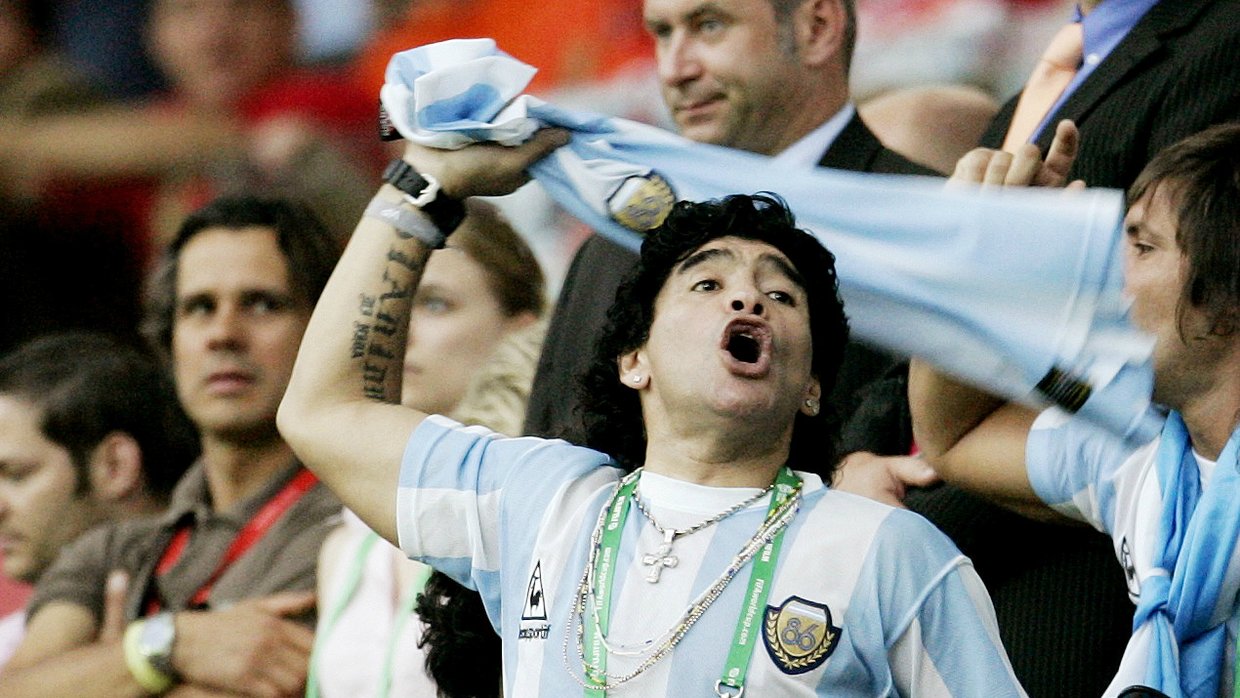Argentinian football legend and winner of the 1986 World Cup, Diego Maradona, has passed away at home in Tigre after suffering a heart attack.
Maradona, 60, was recovering at home following brain surgery in Buenos Aires, where he was treated for a blood clot on the brain earlier this month.
Last Friday, Maradona was sedated by medics after the former footballer suffered issues related to alcohol dependency following his surgery, with doctors describing the legend as suffering from a "mix" of serious issues, including cardiovascular and liver issues.
It was stated that Maradona would require constant support, including admission to an alcohol addiction clinic, following his discharge from hospital.
However, according to Clarin.com, while recovering at home, Maradona suffered a heart attack and passed away shortly afterward.
Also on rt.com 'He's DETERMINED to recover': Football icon Maradona to leave hospital for alcohol clinic TODAY as lawyer hails 'MIRACLE' brain opA legendary career
Maradona emerged from the youth ranks in the late 1970s at Argentinos Juniors, where he scored 116 goals from 167 games before signing for one of the country's biggest clubs, Boca Juniors. His talents were soon spotted by Europe's top scouts, and he was lured away to La Liga by Barcelona before joining unfashionable Serie A side Napoli in 1984, where he became a legend.
On the international stage, Maradona's hot-headed nature was on show as he exploded into the Argentina national team ahead of the 1982 World Cup in Spain. But his temper got the better of him when he was sent off for kicking out at Brazilian player Batista in the knockout stages as Argentina crashed out of the tournament.

Maradona returned four years later with a point to prove, and produced arguably the best tournament performance by a single player in World Cup history as he led Argentina to the top of the world at the 1986 World Cup.
His infamous "Hand of God" goal against hated rivals England elevated Maradona, already an icon in his homeland, to even greater heights, while his second goal in the game, a mesmerizing run from inside his own half, is still regarded by many as the greatest goal ever scored in World Cup history.
His career went on the decline after 1986, but he still led Argentina to the final of the 1990 World Cup, where they lost to West Germany. Issues with banned substances marred his appearance four years later at the same tournament in the United States, and gave a glimpse of the troubles that would befall him after his career.
Maradona latterly stayed in the game as a manager, and enjoyed stints with a host of clubs, including Textil Mandiyu, Racing Club, Al-Wasl, Fujairah, Dorados de Sinaloa and, most recently, Gimnasia de La Plata.
He also took charge of the Argentina national team between 2008 and 2010 and led the team into the 2010 World Cup, where they were eventually eliminated in the quarter-finals.
Personal troubles
While Maradona's successes on the field led to fame and fortune, as well as the reputation as one of, if not the, greatest players to ever play the game, the trappings of success plagued Maradona throughout the latter part of his career and well into his retirement.
Through the mid-1980s until 2004, Maradona battled a cocaine addiction and latterly in his career struggled with his weight. His struggles with obesity eventually led him to undergo gastric bypass surgery.
Also on rt.com 'He's UNMANAGEABLE': Doctors SEDATE Maradona in hospital as football icon recovers from BRAIN SURGERY linked to alcohol dependencyHe also struggled with alcohol, and was hospitalized in 2007 with hepatitis and effects of alcohol abuse. Then, earlier this year, he was admitted to hospital where he underwent brain surgery for a subdural hematoma. But his recovery ended in tragedy on November 25 when it was reported by Argentinian outlets that Maradona had passed away.
After hearing the news of Maradona's death, Argentine President Alberto Fernandez has declared three days of national mourning.
